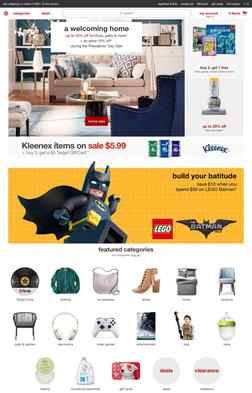Dayton Hudson Corp.
 |
|

Target Corporation headquarters in Minneapolis
|
|
|
Formerly called
|
Goodfellow Dry Goods (1902–1962) |
|---|---|
| Public | |
| Traded as | : TGT S&P 100 Component S&P 500 Component |
| Industry | Retail |
| Founded | June 24, 1902 |
| Founder | George Dayton |
| Headquarters | Target Plaza North Target Plaza South 1000 Nicollet Mall, Minneapolis, Minnesota, U.S. |
|
Number of locations
|
1,828 stores (2017) |
|
Area served
|
United States |
| Products | Beauty and health products; bedding; clothing and accessories; electronics; food; furniture; housewares; jewelry; lawn and garden; pet supplies; shoes; small appliances; sporting goods; toys/games. |
| Revenue |
|
|
|
|
|
|
|
| Total assets |
|
| Total equity |
|
|
Number of employees
|
341,000 (2016) |
| Subsidiaries |
|
| Website | |
|
Type of site
|
E-commerce |
|---|---|
| Website | target.com |
| Alexa rank |
|
| Commercial | Yes |
| Registration | Optional |
| Launched | August 2011 |
| Current status | Online |
Target Corporation is the second-largest discount store retailer in the United States, behind Walmart, and a component of the S&P 500 Index. Founded by George Dayton and headquartered in Minneapolis, Minnesota, the company was originally named Goodfellow Dry Goods in June 1902 before being renamed the Dayton's Dry Goods Company in 1903 and later the Dayton Company in 1910. The first Target store opened in Roseville, Minnesota in 1962 while the parent company was renamed the Dayton Corporation in 1967. It became the Dayton-Hudson Corporation after merging with the J.L. Hudson Company in 1969 and held ownership of several department store chains including Dayton's, Hudson's, Marshall Field's, and Mervyn's.
Target established itself as the highest-earning division of the Dayton-Hudson Corporation in the 1970s; it began expanding the store nationwide in the 1980s and introduced new store formats under the Target brand in the 1990s. The company has found success as a cheap-chic player in the industry. The parent company was renamed the Target Corporation in 2000 and divested itself of its last department store chains in 2004. It suffered from a massive and highly publicized security breach of customer credit card data and the failure of its short-lived Canadian subsidiary in the early 2010s but experienced revitalized success with its expansion in urban markets within the United States.
As of 2017, Target operates 1,834 stores throughout the United States. Their retail formats include the discount store Target, the hypermarket SuperTarget, and "flexible format" stores previously named CityTarget and TargetExpress before being consolidated under the Target branding. Target is often recognized for its emphasis on "the needs of its younger, image-conscious shoppers," whereas its rival Walmart more heavily relies on its strategy of "always low prices."
...
Wikipedia

